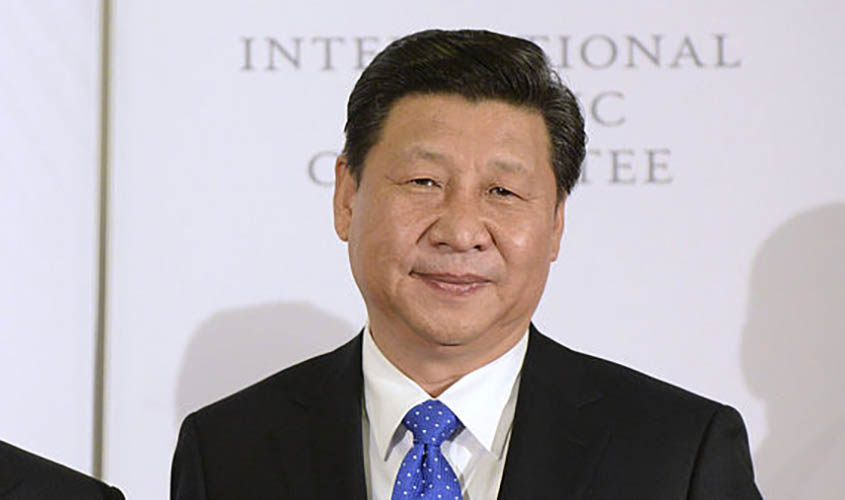The 8.1% increase, or US$175 billion budget, is higher than in the previous two years.
As anticipated and to ensure that China’s People’s Liberation Army (PLA) becomes a “world class force” capable of fighting and winning wars by 2050 as promised by Chinese President Xi Jinping, the first session (5-20 March 2018) of the 13th National People’s Congress (NPC)—China’s version of a Parliament—approved a major 8.1% increase in the national defence budget. The officially announced US$175 billion defence budget is the world’s second highest and gives teeth to the Chinese leadership’s ambition of making China a nation having “pioneering global influence”. The implications, especially for China’s neighbours, are obvious.
Since his appointment as Chairman of China’s Central Military Commission (CMC) in November 2012, Xi Jinping has taken special interest in the PLA. He initiated China’s most far-reaching military reforms to enable a revamped PLA fulfil its tasks of protecting the Party, China’s investments, interests and personnel around the world and safeguard China’s frontiers, sovereignty and territory. Progress has been rapid. As part of the reform, the Chinese Communist Party’s (CCP’s) anti-corruption watchdog body is conducting the most penetrating anti-corruption drive in the PLA, which by September 2017 witnessed the dismissal of over 14,000 PLA officers.
The 8.1% increase, or US$175 billion budget, is higher than in the previous two years. In terms of actual cash, the PLA will have more funds at its disposal. Chinese Premier Li Keqiang and the Finance Ministry’s report presented to the NPC on 5 March 2018, specifically mentioned that demobilisation of 300,000 personnel had been “basically completed”. Importantly, both noted that the entire amount allocated for the PLA last year had been spent, suggesting that the new streamlined system of auditing at all levels by central auditors had yielded results. Other cost saving measures in the past five years include the transfer of many military personnel to other organisations, ensuring a frugal life style, including restricting amenities available to inspecting officers, streamlining and pooling logistics services among the various services, outsourcing of tasks to private companies, etc.
Guo Xiaobing, Deputy Director and Research Professor, Institute of Arms Control and Security Studies at the China Institutes of Contemporary International Relations, a think-tank of China’s Ministry of State Security, described the increase as adequate. He said in the complex security environment China needs a strong military for varied traditional and non-traditional security tasks like protecting maritime rights, countering terrorism, maintaining stability etc. The PLA needs to accelerate and complete IT application and mechanization by 2020. He said China’s military reform is still a work-in-progress and the increased military expenditure will be mainly used for upgrading equipment, supporting military reforms and improving welfare and training of service personnel.
Song Zhongping, a former officer of China’s strategic missile force and Beijing-based military commentator, added that the new funds are to increase training and prepare for potential crises on the Korean Peninsula, the border with India or in the South China Sea or Taiwan Strait.
The PLA Navy (PLAN) is anticipated to get the largest share of the budget, followed by the PLA Air Force (PLAAF) and newly formed PLA Rocket Force. The emphasis on innovation, acquisition of advanced modern defence technology and indigenous development of advanced latest weapons platforms as part of “Make in China 2025” will continue.
There is noticeable emphasis on development of defence R&D, S&T and indigenous production of advanced weapons systems, warships, nuclear submarines, aircraft, missiles etc. The two Vice Chairmen of the Central Military Commission, General Xu Qiliang, former PLA Air Force Commander and General Zhang Youxia, are both strong advocates of acquiring the latest weapons and defence technology. They are joined by new Defence Minister Wei Fenghe, former Commander of the PLA strategic missile force. All have personal ties to Chinese President Xi Jinping. Also 85—or 31.6% of the total number—of PLA Deputies to the NPC possess professional technical backgrounds representing a 2.5% increase over the previous NPC.
The rise in defence stocks on the Hong Kong stock market confirms the thrust on military modernisation. The shares of aerospace companies AVIC (HK) and China Aviation Industrial Park (HK) rose by 10%, while the shares of CNAC International Holdings (HK) and China Ship Defense (HK) rose more than 5%. The shares of hi-tech industries like Glarun Technology Co. Ltd., China Spacesat Co., Ltd. and Hafei Aviation Industry Co Ltd. have specially benefited.
The reports presented to the NPC this year clearly bear Xi Jinping’s imprimatur. They contained prominent references to Xi Jinping and leadership of the Chinese Communist Party (CCP). The budget clearly implies that the “Belt and Road Initiative” will be vigorously pushed along with Xi Jinping’s goal of “rejuvenation of the great Chinese nation” by 2021, in both of which the PLA has a major role.
Jayadeva Ranade is a former Additional Secretary in the Cabinet Secretariat, Government of India and is presently President of the Centre for China Analysis and Strategy.

